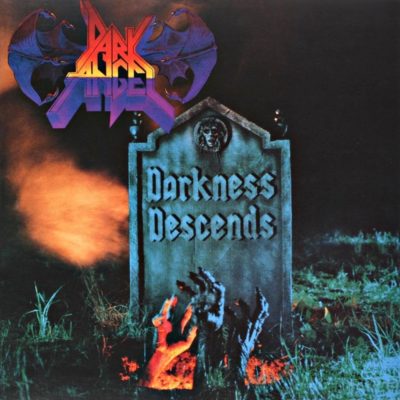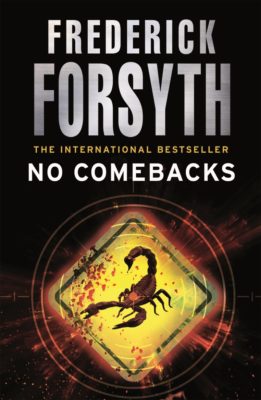1986’s Darkness Descends was one of the most extreme metal albums of its age. I don’t mean the 80s. I mean the age of recorded music. Even in 2021 it’s a shock and affront, a pile of little limbs, a terrifying journey that no combination of programmed drums and Protooled guitar tracks can replicate. Darkness Descends is the Tsar Bomba of metal: decades old, technologically obsolete, but still (in some ways) unsurpassed. It’s less an album than a signpost: mankind went this far into hell and no further.
It’s a good example of pre-death metal (dying metal?). Although it’s still thrash – the vocals are barked but not growled, the guitars are just a semitone down, and the drums lack the intimate, in-the-room quality of early death metal – you can still see that by 1986 we were ready to leave thrash behind.
The riffs are a speed-picked blur, the sound of a guitar sawing through metal. The drumming is intense and technical. And although the seven tracks are still songs, they’re also less than songs. They barely hold together, and constantly seem on the verge of exploding like tempered glass. Dark Angel weren’t the first to point in that direction and they never played death metal themselves (their career ended on a different milestone, the tech-thrash Time Does Not Heal), but once you get here, Scream Bloody Gore, Morbid Angel and Cannibal Corpse become inevitable.
There’s also a surprising Metallica influence. “Black Prophecies” is the band’s attempt at a Master of Puppets style epic, and there’s Hetfieldian touches throughout – like how the title track has that descending-power-chord-over-choppy-riff trick straight out of “Disposable Heroes”. Jim Durkin was a big NWOBHM fan, and “Merciless Death” opens with a tribute to Iron Maiden’s Steve Harris.
Slayer is an even more immediate touchstone. Although Darkness Descends edges out Reign in Blood in quality and heaviness, Gene Hoglan would often mourn the fact that the label couldn’t get Darkness Descends out sooner than November 1986, by which time they were derided as “Slayer babies”.
Like Reign in Blood, Darkness Descends is very, very, very fast. The most excessive tracks are “Darkness Descends”, “The Burning of Sodom”, and “Perish in Flames” which are around 250 beats per minute. Unbelievably, these songs were actually performed faster live. Drummer Gene Hoglan was famous for slamming No-Doz before a show and just beating his kit into scrap metal. It’s a miracle he still has a heartbeat, and maybe he doesn’t.
Fast metal is boring, and these songs are Darkness Descend’s least exciting moments. The snare registers as a weightless popping sound. The guitars lose any semblance of musical notes and become an angle-grinder. Don Doty’s vocals are just a rapid-fire “jabba-jabba-jabba” like an TV informercial salesman rushing through all the terms and conditions. I don’t always skip these songs, but I don’t feel too bad when I do.
When the album slows down, it wrecks all in its path. “Black Prophecies” is among the greatest metal songs ever recorded. If it had any more atmosphere, it’d be the surface of Venus. Tom rolls detonate like thunder. Sections develop in a dark, nauseating churn, each seeming to collapse into the next, while riffs bite like the endless teeth in a shark’s mouth. It’s an incredible song that I appreciate more each time I hear it.
It’s a lesson in how to do much with little. When I play the song back in my head, I hear all things that aren’t there: tolling bells, marching armies, and nagging violin ostinatos. But actually, the “bells” are Rob Yahn plucking high notes on his bass, the “marching armies” are Gene Hoglan playing a sycopated snare rhythm, the “violins” are Durkin and Meyer picking notes close to the bridge. These guys take generic thrash ensemble and bring a whole orchestra to life, which is amazing.
The lyrics in general are interesting, catching Dark Angel at a transitional point. Their first album We Have Arrived tended towards the”we’re a thrash band and we’ll kill you all! BEER! PIZZA! PARTY!!!” school of lyricism. Exodus, while later albums read like an aberrant psychology journal. Here, the lyrics are dark and fantastical, suggesting a world of myth and shadow.
The man singing them proves a mixed bag. Don Doty’s goblin-like barks sound diabolic and menacing, but often he lapses into a kind of talky whisper that’s pushed a bit high in the mix. Part of the problem might be the extreme speed of the songs. Another might be the fact that all the lyrics were written by the band’s drummer – Doty often seems to be struggling to enunciate troublesome syllable clusters that just aren’t natural or easy to sing (“thecityisguilty! the crimeislife! thesentenceisdeath! DARKNESSDESCENDS!!!”) It’s not for no reason that singers usually write their own lyrics, although maybe that’s another way Dark Angel anticipated death metal. It doesn’t matter who writes the lyrics of the average death metal band – the vocals are so incomprehensible and distorted that it’s impossible to tell what they’re saying. For some modern bands I’m almost sure the lyrics sheet is written after the vocal tracks are laid down.
Darkness Descends is an unusual record, and not only for its brutality. Thrash metal is characterized by formal minimalism, with all sorts of disasters resulting from pretension or overdeveloped ideas (Metallica hits that point for some people.) But Dark Angel’s more elaborate moments are the album highlights, while their attempts at ripping your face off are often a little lacking.
No Comments »
St Anger is Metallica’s 8th studio album. It was released in 2003 through Elektra Records, and is famous for being very bad. Worse than previous Metallica albums. Worse than diarrhea. Worse than papercuts. Worse than getting banned from a chat room just when you’re ready to sling a mortally wounding insult. Worse than long trips in a car that’s making a rattling sound. Worse than when the pastor says “now, let’s go a bit deeper into Paul’s contextual usage of ‘divinity’…” at 11:59am on a Sunday morning. Worse than spiders. Worse than Vegemite. Worse than spiders coated in Vegemite. Worse than Vegemite coated in spiders. Worse than hard drive failures. Worse than finishing your Greek homework and realising you forgot the accents. Worse than merging two columns in a 10,000 line database, and the line count is off by one. Worse than people calling the internet “the interbutts”. Worse than puns that aren’t puns (ie, referring to Fox News as “Faux Noose”). Worse than remakes of movies that came out last year. Worse than an old friend wants to catch up and after half an hour of small-talk he says “have you heard of an exciting new business opportunity?” Worse than a friend who tells an unfunny joke and pauses for you to laugh. Worse than filling up your petrol tank from a diesel pump. Worse than knowing that you can’t go to a Halloween party dressed as Charlie Chaplin because everyone will assume you’re Hitler. Worse than holding the bag. Worse than hodling the bag. Worse than having your mother date your high school bully. Worse than having to close your Satanic pedophile ring underneath a pizzeria because people are getting wise. Worse than Googling a computer problem and discovering you’re the first person it’s ever happened to. Worse than realising you were born to play a sport that nobody enjoys. Worse than having a special interest that brings you into contact with nonces. Worse than spontaneously exploding. Worse than biting off half a sushi roll and the seaweed is all ragged and you know there are ragged parts stuck to your teeth. Worse than calling someone “cringe” and then discovering they run a charity for blind dyslexic orphans. Worse than learning enough 3D modeling to notice fake special effects in movies but not enough to be hireable to work on a movie. Worse than being in a Metallica cover band circa 2003. Worse than the 2005 film Elektra. Worse than the fact we’re now 1/4 through Biden’s first term and 80% of all political news stories are still about Trump. Worst than women who describe themselves as “MILFs” when they’re 21 years old. Worse than typing out a 800+ word rebuttal to something that was autogenerated by an AI. Worse than realising you’ve pronounced “hygge” incorrectly for 4 years. Worse than being a Pitchfork hipster and building a time machine and then using it to kill someone other than Hitler because it’s ironic. Worse than being a hand model and your new roommate is a compulsive battle-axe juggler and shuriken collector. Worse than starting something and not finishi
No Comments »
Imagine if you could combine different writers, the way botanists combine grafts of different trees. For example, David Foster Wallace’s lucidity, matched with Terry Brooks’ originality, Anne Rice’s brevity, Dean Koontz’s gritty slice-of-life realism, Harlan Ellison’s humbleness, Stephen King’s ability to really stick an ending, and Dan Brown’s prose. Writing involves several different skills, and no writer is a master of all of them. Reading a book often means enjoying one side of the author’s craft and cringing at another.
Frederick Forsyth is a dramatic example of this. His prose, characterization, and thematic work are bad – some of the worst I’ve ever seen. But his stories are good.
They’re anchored by astounding levels of technical detail. Forsyth had superhuman research abilities. It’s not a figure of speech to say his life depended on them. He wasn’t a tinker or tailor, but at least he was a soldier and spy, and his later career involved flexing the fact-gathering muscles he’d built in the RAF and MI6 (as well as a lengthy career as a journalist in places like Biafra and Nigeria) and using them to write thriller novels.
The typical Forsyth story involves him pounding out reams of fascinating and believable technical detail on all sorts of things…while gingerly walking around his story’s human elements, like a man on thin ice.
The first story in his “No Comebacks” collection draws a highlighter over his strengths and weaknesses. A wealthy, amoral man falls in love with a married woman, and hatches a plot to have her husband killed. The romance scenes are terrible and barely register as such: Forsyth writes like an entomologist describing a strange insect mating ritual. But as soon as the contract killer plotline starts, Forsyth sparks to life. Here’s how you gather intelligence on someone; here’s how you find a hitman; here’s how you conceal a pistol inside a book, here’s how to modify bullets so they make less sound, and on and on. The quotidian detail builds and then sunders apart in a vicious snap.
“There Are No Snakes in Ireland” has more mismatched parts. A Punjabi medical student takes a job on a Belfast construction site, and is bullied by a racist foreman. He schemes up a revenge plot that’s substantially more complex than it has to be, and of course everything goes wrong (or right (or doubly wrong (or doubly right))). The story’s unreal fairytale quality jars against the mundane construction-worker aspects. Forsyth seems most comfortable when describing how to demolish a building.
“The Emperor” is a homage to Hemingway, featuring an exhausting, exhilerating struggle of man-vs-fish on the open waters. Everything around this is silly, particularly the cartoonishly awful wife. Forsyth doesn’t appear to like women much: they seldom feature except as murder victims, nagging shrews, criminal extortionists, and so on. The hero Murgatroyd, like us, happily forgets all of this as soon as he sets out to sea.
“There Are Some Days” is set in Ireland during the Troubles. A truck driver has his lorry hijacked by the Northern Irish mafia, who believe that he’s carrying a shipment of brandy. There are multiple misunderstandings and confusions, finally leading to the most effective twist ending in the book. It’s almost the story with the least humanity, it’s almost as if the lorry is the main character. Forsyth’s descriptions of a truck breaking down and being fixed are infinitely more absorbing than any of his romance plots.
“Money With Menace” is about a nebbish, shy man who seems to have come out of a Monty Python sketch about investment bankers. A sexual misadventure (that Forsyth wisely doesn’t try to depict at all) soon leads to an extortion plot. The tension is exciting, and the ending is spoiled in advance. Too bad.
“Used in Evidence” is about a silent old man who has finally been evicted from his squalid terrace apartment. It’s soon discovered why he didn’t want to leave – there’s a mummified human cadaver behind the fireplace. Has he murdered someone? It’s a blood-freezing tale, with scarcely a trace of humor. It’s very much like Roald Dahl’s stories for grownups, “The Landlady” or whatever.
“Privilege”, by contrast, is as light and insubstantial as a soap bubble. I guess Forsyth heard that you can’t be sued for anything you say in court, and thought he could write a story about this one detail and nothing else.
“Duty” is written in the first-person, with an cautious note from Forsyth that it’s not like the others. I didn’t find it to be that different. It relies on lots of quotidian detail for its effects, weaving together a plot involving mysteries, confusion, secrets, and ambiguous or mistaken identities. It doesn’t have the same knockout punch as “No Comebacks” and “There Are Some Days”, and it’s about an event so far away (both in time and place) from the narrative that it’s hard to care much. It’s like “experiencing” the movie Titanic in the form of two co-workers discussing it ten years after seeing it. Interestingly mainly for the day-to-day details about rural Ireland.
“A Careful Man” is about a dead millionaire who plays a prank on his hated inlaws from beyond the grave. Similar to The Wrong Box and many other squabble-at-the-graveside type stories. There’s more meat to it than “Privilege”, but it’s ultimately a similar tale, ending in poetic justice. The moral seems to be “the law is an ass, so why not go for a ride on it?”
“Sharp Practice” involves a judge who is cozened into a game of poker by a man who – by coincidence, just one day later – he has in the dock for running a card scam. An elaborate story, with Forsyth immersing the reader in poker and having it seem like a fascinating, self-contained universe. Terry Pratchett said that the secret to a magic trick is to know just one extra fact. Here, there’s one fact that the judge doesn’t know, and also one fact that the reader doesn’t know. A fun story, although I guessed the twist a few pages before it came.
No Comments »



